Papers by Abraham Friedman
In the modern paradigm of nuclear, local inter-generational progress, grandparent, parent, and ch... more In the modern paradigm of nuclear, local inter-generational progress, grandparent, parent, and child mean to represent past, present, and future. From the perspective of both the parent and child, this puts most pressure on the present, so that the parent has the most agency, and is ultimately responsible for the failure of progress. As all grandparents were once parents, forget having been children, the relationship between the grandparent and their grandchild is a phantastical model of the child "becoming" mature that makes the role of grandparentage less personal for the past that they represent and, at the same time, that much more powerful for the child.
The Banality of Zombies: Magic and Evil in Haitian Voudun Haitian Voudun enjoys a position in the... more The Banality of Zombies: Magic and Evil in Haitian Voudun Haitian Voudun enjoys a position in the national 1 social structure that affords it significantly more liberty and power than most cultures allow for neo-mystical societies. Voudun presents itself as a dominant patriarchy in Haiti, and has such a strong relationship with the "official" Haitian government that seemingly archaic or anachronistic practices like Zombification continue. The stark reality of the conditions under which Zombies are created comes from the process, but the magic is in the combination of three factors. The process owes a lot to the accumulation of empirical data collected by ancestors about psychology, physiology, and toxicology.
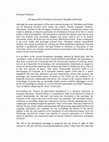
Although the scope and gravity of Foucault's historical project in "Discipline and Punish can be ... more Although the scope and gravity of Foucault's historical project in "Discipline and Punish can be daunting, Foucault never denies his readers, thereby humanity, freedom. Alternately, "freedom is the ontological condition of power," meaning that power only works to motivate us toward a particular set of behaviors because we're free to choose within a field of possibilities. Foucault gestures towards less obvious ways that we may have less freedom than previously imagine, but power itself is not to be blamed exclusively; rather, the forms into which power differentiates itself. Power as discipline is the most visible and seemingly invasive form. Discipline exhibits unparalleled mastery over minds and bodies by creating. Are these inhibitions legitimate? Foucault provides a paradoxical answer and goes further to elaborate of conception of true exteriority; there's an economy of power between exteriorities where history and time seem to be the chief currencies.
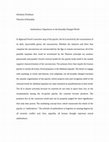
In Sigmund Freud's narrative map of the psyche, the Id is marred by the connotations of its dark,... more In Sigmund Freud's narrative map of the psyche, the Id is marred by the connotations of its dark, inaccessible genus, the unconscious. Whether the instincts and drive that comprise the unconscious are unconcealed by the Ego or remain unconscious, all of the possible impulses that could be scrutinized by the Pleasure principle are present, pleasurable and painful. Freud's vertical model for the psyche lends itself to the mostly negative characterization of the unconscious. The primary force that impels the human psyche to nearly all action, Freud proposes, is the libidinal impulse. The desire to engage with anything, to create and destroy, even solipsism, are all sexually charged reactions the somatic organization of the psyche, which projects onto and recognizes itself in the external world. So, libidinal impulses are only evaluated as manifestations in that world. The Id is chaotic precisely because its contents do not exist in space-time, but, in the transmissions among the tri-partite psyche, the contents become products. The products live in the conscious world and can be properly judged for their significance that only time proves. The mediating concept here, which transcends the whole of the psyche, is "ambivalence." The attitude of ambivalence is begotten in varying degrees by, all neurotic conflict and, thus, arguably, all human thought expresses sexual ambivalence.
Berlin: History, Memory, Literature
The Ethical Use of Eccentricity in Bruno Taut's Berlin Projects Although Bruno Taut was among tha... more The Ethical Use of Eccentricity in Bruno Taut's Berlin Projects Although Bruno Taut was among that first wave of young modernist progenitors, like Walter Gropius, Ludwig Mies Van der Rohe, and J.J.P. Oud, who were favored by Social Democrats to design the new worker housing for post-war Germany, his realized designs stand out over those of his more conservatively modern peers. It is a testament to his successful ingenuity that projects like Onkel-Toms Hutte (1926) and The Britz Estate , even today, exude the same aura of progress that they must have in the 1920's.
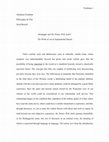
Film’s earliest years and adolescence were in culturally volatile times, where escapism was under... more Film’s earliest years and adolescence were in culturally volatile times, where escapism was understandably favored but poetic and social realism gave film the possibility of being important to the world as it stumbled brazenly toward a chaotically uncertain future. The concepts that film was capable of mobilizing were disconcerting precisely because they were true. The deficiencies in humanity that Nietzsche identified as the fatal flaws of the Western world, a debilitating blend of the popular nihilistic attitude with the even-more-pervasive ennui epidemic could be defanged by a great filmic experience. Here the spirit and anxiety turned inward by the Protestant view of our relation to the world could be externalized in our relationship with movies. This relationship hinges on the condition that, regardless of the infinite qualia of a film, others have seen the same movie, others could have a similar interpretative experience, and that, through discourse, we can re-enter the crafted Dasein with others and work to expose its truth beyond our own subjective experience.
My Dinner With André portrays beautifully, in the Heideggerian sense, this sort of discourse as an isolated event, the meaning of which is expressed through language as language. The action, save from the introduction, is simply a real-time catching-up between two playwrights and former colleagues/friends. The history of their friendship and the “events” in the movie are only made real for us as far as the two characters describe them; There are no flashbacks or dramatizations. Wallace Shawn espouses a cynical and regretful understanding of his own world, while Andre Gregory, through a few decades of truly bizarre phenomenological experiences, has come to certain conclusions that echo Heidegger’s task of “letting-being-be.”
Overly purple attempt to substantiate the ethical grace of Deconstruction. In reading Derrida on ... more Overly purple attempt to substantiate the ethical grace of Deconstruction. In reading Derrida on Levinas, one sees clues that prove that the Alter-Ego commands respect. Recommended for those experiencing symptoms of de-personalization.





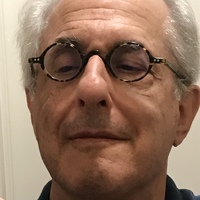
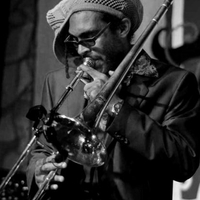

Uploads
Papers by Abraham Friedman
My Dinner With André portrays beautifully, in the Heideggerian sense, this sort of discourse as an isolated event, the meaning of which is expressed through language as language. The action, save from the introduction, is simply a real-time catching-up between two playwrights and former colleagues/friends. The history of their friendship and the “events” in the movie are only made real for us as far as the two characters describe them; There are no flashbacks or dramatizations. Wallace Shawn espouses a cynical and regretful understanding of his own world, while Andre Gregory, through a few decades of truly bizarre phenomenological experiences, has come to certain conclusions that echo Heidegger’s task of “letting-being-be.”
My Dinner With André portrays beautifully, in the Heideggerian sense, this sort of discourse as an isolated event, the meaning of which is expressed through language as language. The action, save from the introduction, is simply a real-time catching-up between two playwrights and former colleagues/friends. The history of their friendship and the “events” in the movie are only made real for us as far as the two characters describe them; There are no flashbacks or dramatizations. Wallace Shawn espouses a cynical and regretful understanding of his own world, while Andre Gregory, through a few decades of truly bizarre phenomenological experiences, has come to certain conclusions that echo Heidegger’s task of “letting-being-be.”